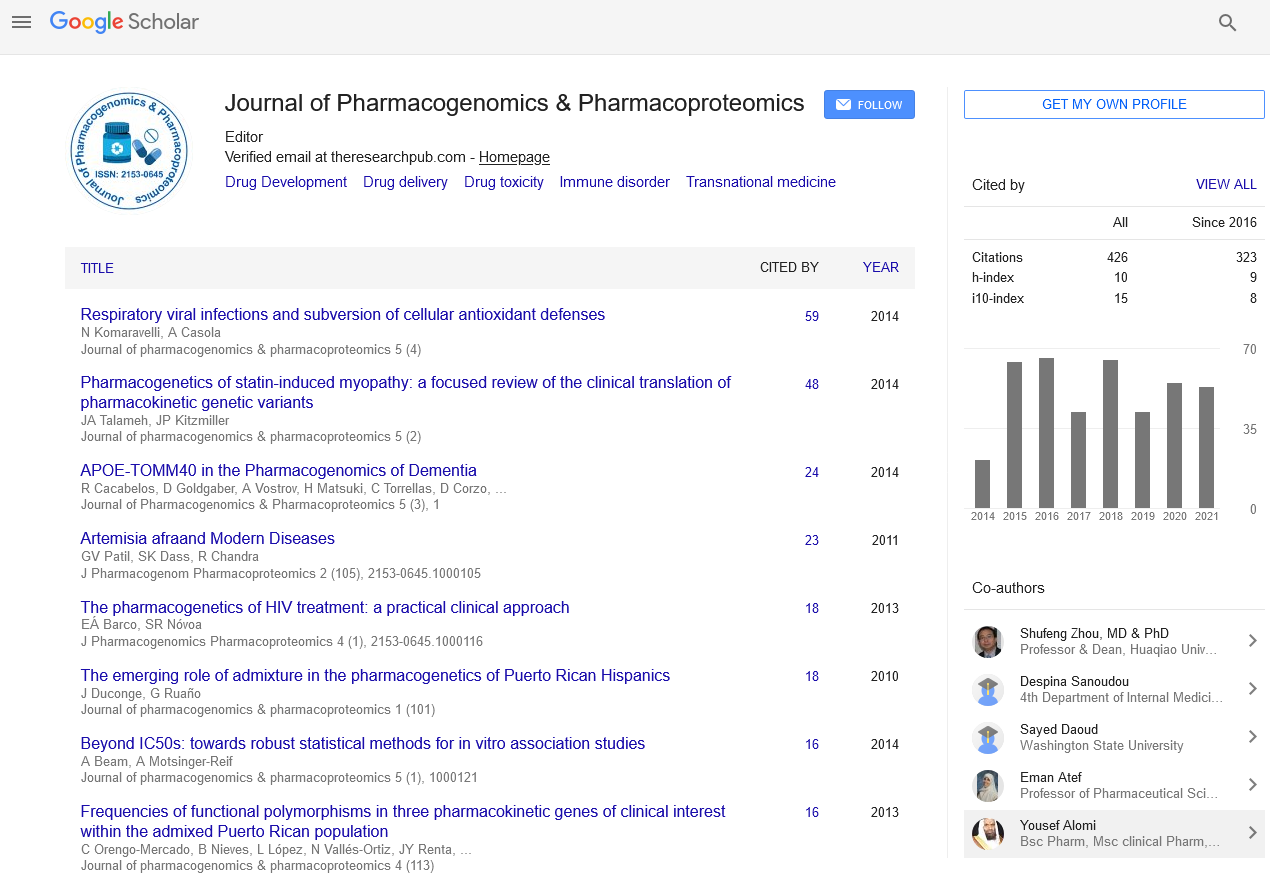Indexed In
- Open J Gate
- Genamics JournalSeek
- Academic Keys
- JournalTOCs
- ResearchBible
- Electronic Journals Library
- RefSeek
- Hamdard University
- EBSCO A-Z
- OCLC- WorldCat
- Proquest Summons
- SWB online catalog
- Virtual Library of Biology (vifabio)
- Publons
- MIAR
- Euro Pub
- Google Scholar
Useful Links
Share This Page
Journal Flyer

Open Access Journals
- Agri and Aquaculture
- Biochemistry
- Bioinformatics & Systems Biology
- Business & Management
- Chemistry
- Clinical Sciences
- Engineering
- Food & Nutrition
- General Science
- Genetics & Molecular Biology
- Immunology & Microbiology
- Medical Sciences
- Neuroscience & Psychology
- Nursing & Health Care
- Pharmaceutical Sciences
Prevalence of vitamin D deficiency in adult patients with systemic lupus erythematosus, in kingdom of Bahrain
JOINT EVENT ON 6th European Conference on Predictive, Preventive and Personalized Medicine & Molecular Diagnostics & 2nd World Congress on Human Genetics
September 14-15, 2017 | Edinburgh, Scotland
Adla B Hassan
Arabian Gulf University, Bahrain
Posters & Accepted Abstracts: J Pharmacogenomics Pharmacoproteomics
Abstract:
Introduction: Vitamin D deficiency (VDD) has been implicated as an important factor in the development or aggravation of systemic lupus erythematosus (SLE). Patients with SLE are especially prone to the development of VDD due to the nature of their illness and avoidance of sun exposure. However, the prevalence of VD status in Bahraini patients with SLE has not been studied before. Aim: Our aim is to study the prevalence of VDD in Bahraini cohort with SLE. Material & Methods: Fifty-eight Bahraini patients with SLE were included retrospectively in this study. The mean age of the patients, was 39.78 years (16.0 - 61.0, STD 12.98). Most of the patients were females 50/58. The patients were followed in the rheumatology department at "Salmanyia Medical Complex" in Bahrain. Controls were 58 age-matched healthy Bahraini subjects. Serum levels of 25 (OH) vitamin D3 were estimated using chemiluminescence immunoassay. Chi Square and T-Test were used for analysis and p value of �?� 0.05 was considered significant. Results: There was statistically significant difference (p �?� 0.05) in the mean serum levels of vitamin D between patients (30.67 nmol/l) and controls (39.95 nmom/L). There was a statistically significant difference in Phos, PTH and ALP between patients and control group with a p �?� 0.001 for each. In the SLE patients there were 49.1% deficient, 45.1% insufficient and 3.8% were Optimal. In the controls; 27% was deficient, 52% insufficient and 21% optimal. Conclusion: There was high prevalence of VDD in Bahraini patients with SLE. Both patients and controls had low vitamin D levels, however the patients had statistically significant lower vitamin D serum levels compared to the controls. Our study also highlights the need for studying the effects of correcting hypovitaminosis on the clinical disease activity in Bahraini SLE patients.
Biography :
Adla Bakri Hassan is MD (Sudan), MPhil (Sweden), PhD (Sweden), PGDip (MSK US, Spain), She graduated from Gezira University in Sudan. She did her postgraduate studies and training at Karoliniska Institute and Karoliniska Hospital in Sweden, also at Hope Hospital in United Kingdom. She has experiences over 20 years in different hospitals and countries treating rheumatic disease patients; Sudan, Sweden, UK and Bahrain. She has over 10 years’ experience in teaching medical students. She is currently working as Assistant Professor in the department of internal medicine at Arabian Gulf University (AGU) in Kingdom of Bahrain and as Consultant Rheumatologist at the University Medical Centre (UMC). She is a Reviewer and has over 20 publications in peer-reviewed journals.


